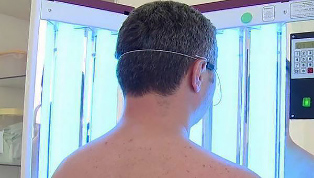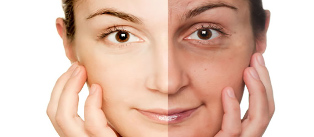Disease, such as psoriasis, can deliver a lot of trouble to its owner, because its symptoms, of course, the number of tracks the patient's quality of life. In addition, psoriatic lesions are accompanied by intense itching and burning, which exacerbates the situation.

The disease is chronic and hard enough and long discussed. In winter, the cutaneous manifestations can be hidden under clothing, but with the onset of summer, when the schedule holiday by the sea, many of the women and men concerned with the question whether tanning psoriasis and how the sun affects the development of the disease?
Compatible with sun and psoriasis?
As a rule, the psoriasis faster organized for the summer. This is due to the likely positive effect on sea water, air and sun. The summer condition of the patient the skin is clearly improved, because exposure to UV rays to prevent the development of pathological processes on the surface of the skin.
In recent years, increasingly the emphasis is on the close relationship between psoriasis and vitamin D in the body of the patient. We all know that vitamin D given to children at an early age, as preventive measure against the development of rickets.
However, few people know that lack of vitamin D in the blood of patients suffering from psoriasis (especially in cold weather running), contributing to exacerbation of the disease.
Therefore, dermatologists recommend to take sun baths, since the UV light promotes rapid skin regeneration with platelets and the healing of open wounds.
Remember, however, that sun baths should be administered, so it is recommended to sunbathe at certain times, in order to avoid burning the skin. Due to the fact that psoriasis refers to an autoimmune diseases, excessive sunburn, is a risk of developing cancer of the skin premature aging of the skin.
Note that there are at least 5% of patients who suffer from a photosensitive form of psoriasis the skin. Often such patients with psoriasis with concomitant allergic skin lesions that occur as a result of increased sensitivity to sunlight. These patients, on the contrary, are encouraged to protect themselves from the sun.
Rules the sun
When psoriatic arthritis symptoms should be taken only after consultation with your doctor. The first day of the rest of the sea you can sunbathe no more than 10 minutes. Further, the duration of the tan can be increased. However, throughout the period of exposure to the sun must not exceed half an hour.
The sea recommended to take the sun in the morning (5-11 hours), afternoon (16 — 20 hours). The most dangerous time of between 12 hours and 14. Currently, the sun is most active, so if possible, you should avoid direct sunlight. In addition, you can protect yourself from the sun with special protective creams and lotions.
Psoriatic plaques it is recommended to use creams that contain activated pyrithione your zinc.
On the downside, exposure to the sun, it is necessary to use sunscreen lotions and creams, like most topical treatments contain components that can worsen the symptoms of psoriasis. Other components can interact with other drugs prescribed to relieve the psoriatic plaques.
Therefore, sunscreen products should choose a dermatologist, because many of them have side effects and require individual approach to the patient.
The beneficial properties of the sun psoriasis
The sun's rays have the following effects on the skin psoriasis:
- uv light is a slow destructive effect on the upper layer of the epidermis;
- the sun triggers the body to strengthen protective forces;
- activate tissue regeneration;
- reduces flaking and the formation of psoriatic plaques;
- to relieve the itching.
Sun contribute to skin thickening, which increases the flow of oxygen to the lymph nodes in the subsequent long remission.
The possibility of using tanning for psoriasis
Artificial uv light effectively used in patients with psoriasis, especially in winter.
UV treatment can be used in two forms:
- UVB. In this case, using short-wave uv rays.
- PUVA-therapy. This form uses long-wave radiation with light (Psoralen) of natural origin.

Use Solarium treatment of psoriasis today refers to traditional treatments and is expressed by the following function:
- as a result of exposure to uv rays is the production of endorphins (happiness hormone), which positively affects the central nervous system;
- The Solarium can relieve the acute symptoms are manifestations on the skin;
- when you get artificial tanning induces the production of vitamin D, which prevent nervousness and stress in the body. These indicators belong to one of the reasons of the disease development.
Recommendations for the use of the Solarium
First of all, please note that the Solarium and the sun can not replace a comprehensive treatment for psoriasis, therefore, before start using these procedures, it is recommended to consult a dermatologist.
You must meet the following conditions:
- not to visit a Solarium in the acute stage of the disease, the patient deteriorated and increased skin sensitivity, which can cause burns;
- treatment of the disease is recommended to choose vertical Solarium, which is much more effective than horizontal;
- still image of the cabin can be up to 6 minutes;
- it is best to visit a Solarium in a day;
- the entire course of treatment using a Solarium is not to exceed 25 sessions of 5-7 minutes.
It is important to note that some medications and cosmetic products may cause an acute allergic reaction, which further leads to increased sensitivity of the skin in the Solarium and sun. Therefore, before you can visit a Solarium, and a trip to the sea, require medical.
Prevention
The treatment of the sun has positive aspects and negative. Despite its beneficial properties, from uv rays, if used improperly can cause sunburn, in the form of watery blisters, when the skin. This condition leads to increased itching. As a result, often is the accession of secondary infection. In addition, the UV rays dry up, leading to premature skin aging and the formation of benign and malignant tumors.

The photo-sensitive psoriasis light therapy should be under the supervision of a specialist. In other cases, you should observe moderation. Most of the sun, responds well to treatment guttate form of psoriasis, because of the minimal damage on the skin.
It is recommended to take the solar dose, preferably in the morning and in the evening, to avoid the aggressive sun exposure. In that case, if the rest of the sea fail, you can replace it with the nearest body of water in compliance with all safety regulations.
It is important to remember that the light treatment, and all treatments should be done only after consultation with your doctor. It can cause adverse symptoms on the skin.
























